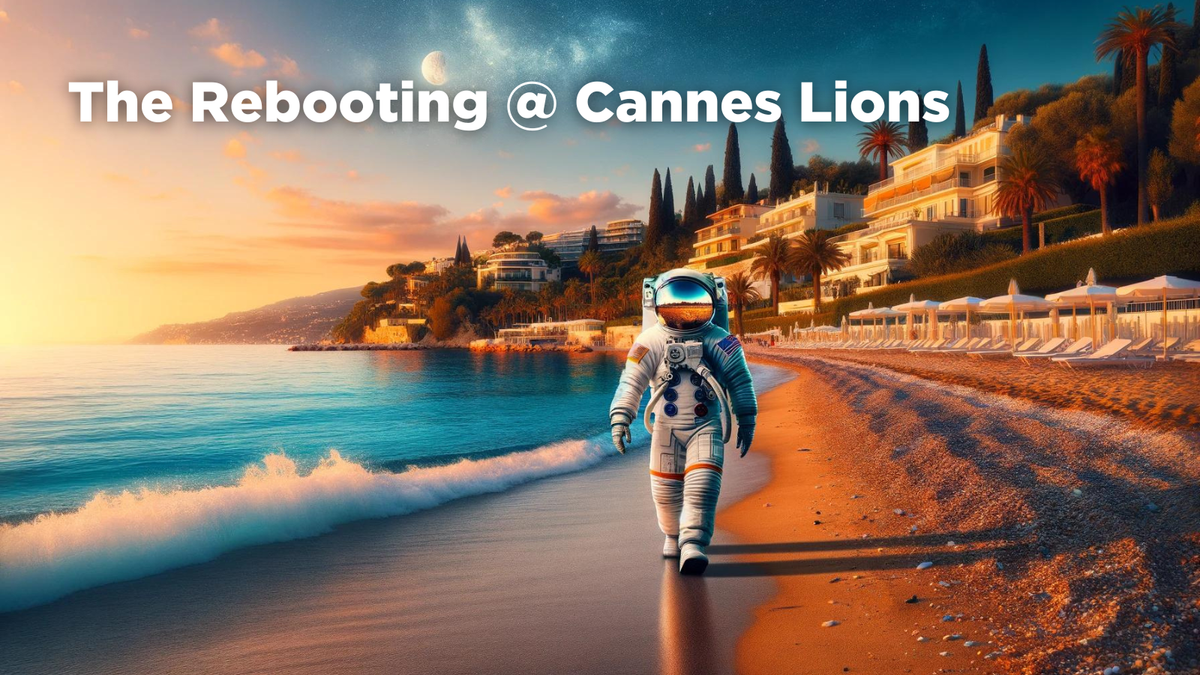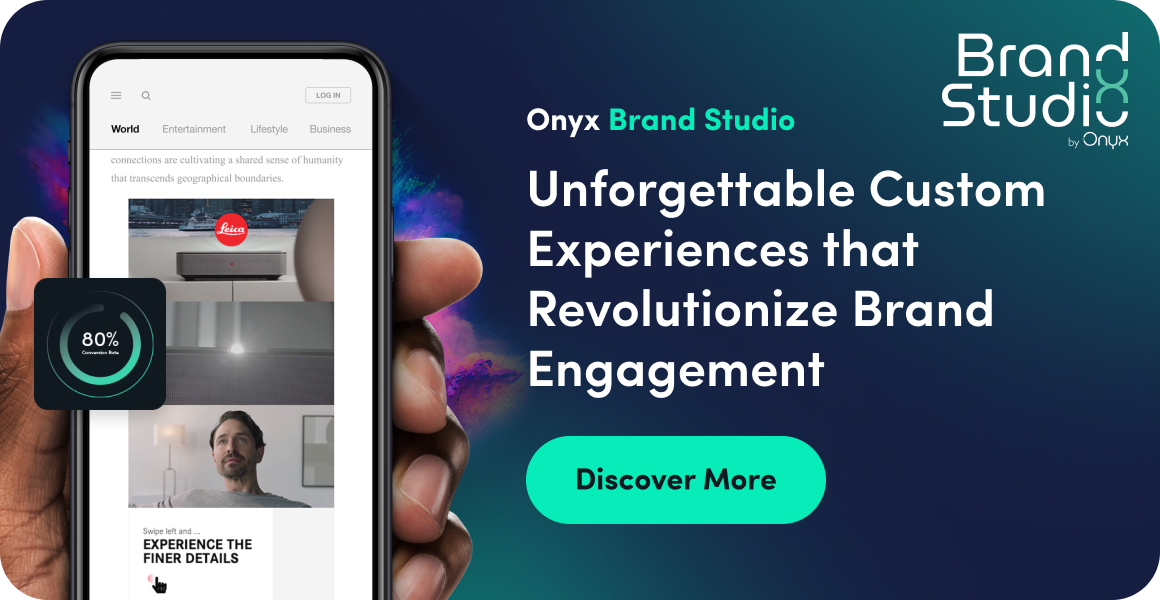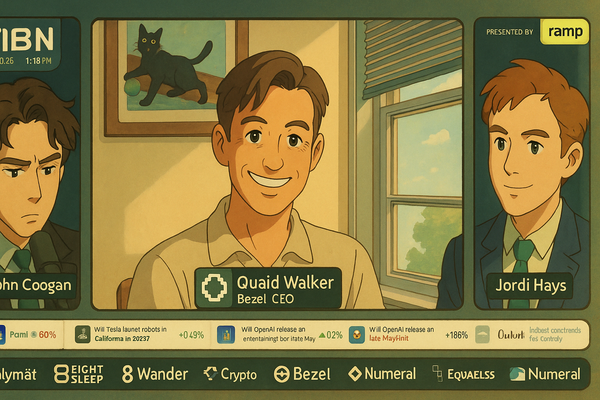Supporting news

We kicked off Cannes with a terrific dinner last night in Grasse, in the hills above Cannes, with our partners at Permutive. We had a lot of great conversation about the state of publisher advertising businesses. The general consensus: Good Q1, less good Q2, cautious optimism for the back half of the year, general existential dread long term. More on that below, along with the question of how much news publishers should rely on advertising.

Impact through creativity

Creative content holds significant sway, contributing to 47% of total sales impact according to the IAB. In a digital world where attention is the currency, high-impact display and video creatives are essential tools for brands to forge genuine connections and drive meaningful results. The effectiveness of these creative experiences hinges on their ability to engage audiences in moments of high attention, ensuring that every interaction counts.
Data-driven design through Onyx Brand Studio has shown a +68% lift in purchase intent, demonstrating the power of tailored, bespoke brand experiences. Dive into the potential of uniquely engaging creatives with Onyx Brand Studio—where your brand's story comes to life.
Around the Croisette
It’s not just about the data. I’m struck by how Cannes has embraced sports to such a degree. Stagwell’s Sport Beach is hosting an array of athletes. Athletes are roaming the Croisette. (WE all need to hustle, even Carmelo Anthony because that wine isn’t going to sell itself.) Sports are winning because they’re a throwback. They have cultural heft and are one of the last mass cultural events left. No matter what brands say to the ad tech people, they want to embed in culture. That’s something atomized performance marketing cannot do. Cannes is full of data brokers promising laser targeting. Meanwhile the Euro championships are going on and billions are spent without much targeting. As Kate Scott-Dawkins noted in our conversation yesterday at the GroupM rooftop, sports is often filling the role of religion as one of our last communal pursuits.
One underappreciated change with top marketers is how data driven and analytic many of the roles have become, despite the sort talk of purpose, storytelling and purpose. I find far more top marketers very comfortable discussing econometric attribution models and the inherent flaws in multitouch attribution. I’ve come to Cannes long enough to remember when I’d mostly hear earnest debates over whether an ad of a gorilla playing drums deserved the top award.
Experiencing GDPR in its purest form in Europe is enough to give the most faithful statist pause when calling for a government AI regulatory framework. Publishers can’t rely on AI deals because these companies simply want publishers to shut up while they battle for compute. They can’t trust that governments will intervene, since the cases where they have turned out to be disasters. Then again, I asked Kate if she can see any evidence in the data that privacy regulations, regularly held up as the end of civilization, have dented ad spending, and she has not. Almost makes me consider not taking everything the IAB says as gospel.
The Elon mystery. Cannes loves celebrities. Elon Musk is the star attraction today at the Palais, where he will sit down for a softball interview with WPP CEO Mark Read. The last time Musk talked directly to advertisers he told them to GFY. Twitter used to have an outsized presence here with a prominent beach location. That didn’t survive the extremely hard core era Musk ushered in. Musk’s discussions of advertising to date betray a profound lack of interest in it.
Cannes tip: Cancel half your meetings. You overbooked yourself. Trust me. And it’s not worth it. You’ll just be stressed out or end up ghosting people. Let serendipity guide you.
Can ads support news?
Check out my conversation yesterday with Outbrain CEO David Kostman, GroupM global president of business intelligence Kate Scott-Dawkins and Washington Post chief advertising officer Johanna Mayer-Jones. We discuss the essential challenges publishers face in the ad market as well as proactive steps they will need to take to compete. Listen on Apple | Spotify | other podcast platforms
Silicon Valley people like to talk about “first principles thinking,” or basically just setting aside assumptions to look at things without preconceptions.
This is a useful exercise for the news industry. Among the drama at the Washington Post, I found heartening Jeff Bezos urging Post executives to be bolder in their thinking. The third newsroom is easily dismissed but speaks to a need for legacy organizations to start fresh.
One of the essential questions for the media business I’m pursuing this week is what role advertising will play in a sustainable, equitable and resilient news business ecosystem. It’s an open question. The shining success case in general news remains The New York Times. And its success is not due to advertising but diversifying away from ads.
A regular theme in my conversations with publishers is their moves to similarly diversify their revenue streams. I always ask from what. And that’s often advertising, a market one publishing executive at The Rebooting’s dinner compared to fighting for scraps left over from the tech companies. The Big Five tech companies now gobble up 72% of ad spending. There’s a reason the big activations in Cannes are from tech companies while publishers are relegated to more modest “house” setups off the beach. (The Wall Street Journal, Bloomberg and The Washington Post all have some kind of house setup.)
But here’s the thing: Ads are still a very good business because ads are very profitable. There’s a reason every commerce service and tech company ends up an ad network. This is high-margin revenue. Publishers wanting to diversify are often pivoting into events and activations. Those carry far higher costs.
News publishers face several issues with ads. They lack valuable intent data. They have shrinking audiences thanks to search and social referrals going into steep decline. They are divisive and incite negative emotions. They have horrible user experiences. They have done too little to build audience loyalty through utility. I keep asking publishing executives if they expect to be making much money off ads on webpages in five years.
And yes, they deal with the brand safety industrial complex. One news publisher found their own brand name on the block list for their site. The stories of block list insanity are resonant because any sane person would realize how unworkable this approach is, leaving aside all the data showing that people don’t have a negative association with a brand because they advertise news content. At some point, I have to believe The Brands that go on and on about purpose will put an end to the madness. I’m a purist. You can skip the news, but then also skip the public moralizing.
The new Reuters Digital News Report confirms this product problem: Ads are an increasingly difficult market, but subscriptions are not a savior. Most people say they won’t pay any amount at all for any news content.
“The news business is in a difficult spot and more publishers are looking to direct reader payment as a primary strategy to supplement advertising revenue. But in all countries we find that only a minority (17%) are willing to pay and, as we have shown, the rest are not prepared to pay very much at all. The majority (57%) would not consider paying anything.”
No silver bullets. But the shift to subscriptions has forced publishers to get serious about the signals they’re collecting. Context is not enough. They need better signals that can be used to serve ads the ad tech people would call performant. Cannes is full of virtue signaling, so I don’t take much of the messaging literally, but there’s something off with the many sessions devoted to “supporting news” like it’s some kind of charity. That is likely the direction for some aspects of the news business, which will rely on voluntary donations, benevolent benefactors and foundation grants. But this is still a business.
In a podcast recording we did yesterday at the GroupM rooftop, Outbrain CEO David Kostman made this point clearly. Publishers need to show their ads work, even if they do not have the closed-loop attribution systems of platforms and retail media.
It’s hard to see how ambitious news organizations can be wholly or even mostly dependent on advertising, particularly if the pitch is based on the notion that spending ad money on news is being a good corporate citizen. There’s no ESG of ad buying. CMOs don’t get bonuses based on purpose.
There’s evidence that advertising in news is helpful for advertisers. These studies are self-motivated, but they fail to take into account other downsides. Brands have mostly retreated from their activist roles and want to go back to greasing capitalism vs leading social change.
The challenge for publishers is how to go beyond relatively weak contextual signals. After all this is an industry that for years tried to pass off people who ended up on a couple auto pages as “in-market car buyers.” Publishers don’t lack data, but they often lack the market considers the right data that can drive performance. Ultimately, the pendulum usually swings too far in this industry. And right now, it’s swung too far away from brand and to performance. That will self-correct. Just look at the DTC market: These companies were propped up on performance marketing and ended up not having much to show for it because they didn’t build actual brands.
Another improvement: making it easier to buy. I imagine it drives Jeff Bezos nuts how few ad customers the Post has. Direct sold doesn’t have to mean manually sold. I tend to tune out anytime there is talk of publisher coalitions (like micropayments, they never work), but I hear more urgent talk of concerted action at a time of what one publishing executive called an “existential” moment.
Thanks for reading. Send me a note with feedback by hitting reply.




